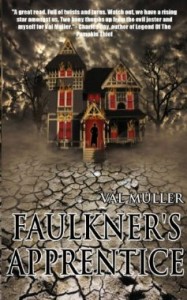As the author of a light-hearted mystery series for kids, people have been asking me lately, “why horror?” Some seem surprised that mild-mannered Val would write about ghosts and murder and a bad man who seeks everyone’s demise.
The reason I like horror is the same reason I like 1984 by George Orwell. In 1984, Winston’s spirit is tested to its breaking point—and it breaks. The novel does not follow the typical formula of an archetypal tale. There is no return to home with a new mastery of the world—at least, not in the traditional sense. 1984 ends in what I consider the most despairing final scene in literature. Though the tone of the last chapter is calm and happy, the irony between tone and content is horrifying: Winston has been completely broken down by months (years?) of torture and brainwashing, and he is convinced that the enemy of all mankind’s freedoms, Big Brother, a being/idea he once detested, is there solely for his benefit. In the end, his spirit is completely broken. He loves Big Brother, and he cries tears of happiness that he has finally been saved from himself and his horrible thoughts of freedom.
For me, 1984 is a wake-up call. Sure, it’s a hyperbole (at least for now!), but each time I read it, which is at least once per year, I get chills. I imagine all the horrible things that might become of our society, and I appreciate what I have all the more. I take more deliberate steps to educate myself about things that could, at some point, turn our world into an Orwellian nightmare.
Horror has the same effect on me. When I read horror (and I prefer psychological, suspense horror—not hack-and-slash horror), I am awakened from the banality of life. In Faulkner’s Apprentice, Lorei is stuck in a rut, working dead-end jobs in hopes of making it big as a writer. She gets annoyed at her friends (whose lives seem to be coming together rather nicely), but she doesn’t quite appreciate all that she has going for her. When the bad man enters her life, Lorei is awakened. When the bad man threatens her mother’s ailing mind, Lorei realizes how much she has taken her mother for granted. When the bad man tempts Lorei with a taste of success, Lorei realizes just how much she wants to achieve success that she was previously unwilling to work for. Though it happens in a disturbing, sometimes gruesome, way, the horror in Faulkner’s Apprentice awakens Lorei.
I don’t like the Saw movies at all. I have never been able to get through an entire one (at least, not without looking away), and I never tried to make it past Saw II. But I completely “get” the premise (at least, as far as I understand it from the limited amount of screen-time I was able to see). The mastermind in Saw who tortures people has a somewhat admirable motive at its core: he wants his victims to truly appreciate life, and he believes that by pushing them to the brink of death, he will achieve his goal. Granted, the way he goes about teaching them to appreciate life is illegal, immoral, demented, despicable, and disgusting. Yes, so disturbing that I can’t even bear to watch. But the point of those films is a hyperbole of the point I am making here. Horror pushes us to the edges of our comfort zone with the goal of awakening us from the blending-together of days in our lives.
With so much technology and so many conveniences, it’s easy for the days to blend into each other, for years to happen without our consent. Horror, for me, is an alarm clock, a wake up that pushes us to—in the words of Thoreau—live deliberately.
 You can check out Faulkner’s Apprentice for about the cost of a cup of coffee at this link.
You can check out Faulkner’s Apprentice for about the cost of a cup of coffee at this link.
Lorelei Cecelia Franklin broke a twenty-year streak of bad luck when she won the L. Cameron Faulkner fiction contest. Apprenticed to the reclusive and famous author, Lorei will spend three weeks with the master of horror himself in the secluded mountains of Virginia. On her way to Faulkner’s mansion, Lorei meets a leathery man who snares souls that desire too much, and everything in the mansion screams warnings against him. But with her lust for Faulkner, her appetite for fame, and her wish to protect her ailing mother, Lorei’s chances for escape are slim.